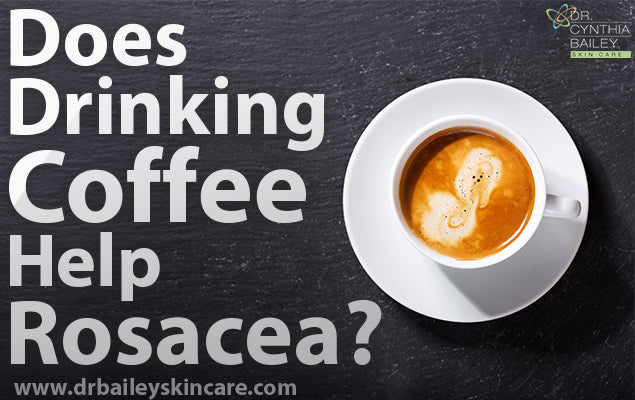Does Drinking Coffee Help Rosacea?

Does drinking coffee help rosacea....... the answer is YES according to a recent study published in JAMA Dermatology.
Drinking coffee found to help improve rosacea.
Data collected from the Nurses’ Health Study II identified an inverse relationship between caffeinated coffee consumption and rosacea. The more coffee they drank, the better the correlation. Also, decaffeinated coffee did not have this power over rosacea and neither did other caffeine containing food or drinks such as chocolate, tea, soda, etc.
Why might coffee be helpful for rosacea?
Caffeine is a vasoconstrictor and anti-inflammatory. Coffee contains antioxidant polyphenols which have been shown to benefit rosacea. Coffee also has more caffeine than other caffeine-containing food and beverages such as tea and chocolate.
Authors hypothesize that these reasons may be why caffeinated coffee stands out as helpful for rosacea. But we don’t really know. This study just provides the first observation and correlation.
What’s impressive is that the number of participants in the study was high — 82,737 — meaning, this info comes from a lot of people.
Why is this information about coffee and rosacea new?
We’ve known that hot foods and heat trigger rosacea flares. We lumped all hot drinks together – tea, coffee, chai, a cup of hot soup, etc. We also know that spicy foods, strenuous exercise and sunlight will trigger rosacea flares. These are called “trigger factors.”
Now, we’ve teased out coffee, which has come up to be a winner. It’s hot, but it’s correlated with less incidence of rosacea! I’m drinking my morning cup as I type this, and I’m prone to the erythematotelangiectatic-type of rosacea.

Other factors that might impact a person’s physiology did not negate this helpful effect of caffeinated coffee on rosacea. These include factors such as smoking, alcohol intake, physical activity, or BMI, for example.
It means that drinking caffeinated coffee, in and of itself, seems to help rosacea. Having four or more servings a day was the most protective.
Of course, one needs to balance that with their other health issues and consider how much coffee they drink within the context of their overall health.
Also, sugary coffee drinks add carbs, calories and higher glycemic levels to one’s body, and we know that will drive inflammatory health problems such as diabetes, acne, psoriasis, cancer risks, etc. – and potentially, rosacea. Thus, a simple cup of Joe, minus the sugar, is the smartest way to go.
As a dermatologist, my opinion is that that drinking caffeinated coffee, along with eating an anti-inflammatory diet, might stack the odds in favor of less rosacea. It’s potentially a natural and healthy treatment for rosacea.
What else can you do to help your rosacea?
We know that your skin care can really help or hurt your rosacea. That’s because your skin’s barrier integrity is damaged when you are prone to rosacea. You need to care gently for your skin barrier so that it can heal. Any exposure to harsh, skin-care products, climate, chemicals, or procedures may set-off your rosacea.
The right skin care routine is important to heal and control rosacea
I always recommend an anti-inflammatory and supportive skin-care routine for my rosacea patients. Compatible products that heal rosacea are combined to cover all the bases that trigger rosacea. My Rosacea Therapy Skin Care Kit has all the key ingredients to calm and control rosacea.
Did you know that sun exposure is a rosacea trigger factor, too?
It's true. You need to wear daily, broad-spectrum sunscreen that’s not irritating. Mineral zinc oxide is the best choice for rosacea. It gives you the non-irritating, broad spectrum.
My Rosacea Therapy Kit gives you options for your rosacea skin care.
Choose from the products I use to build rosacea skin-care-routines in my dermatology practice. I give you choices based on your skin type and the type of rosacea you have.
Click here to learn more about my Rosacea Therapy Kit.
Take control of your rosacea - read these guides:
- Rosacea Treatments & Skincare
- Acne Rosacea Types, Symptoms, Triggers
- Retinol, Retin A & Tretinoin: Anti-Aging Rosacea Treatment
- Demodex Mites and Rosacea Treatment
- Seborrheic Dermatitis (Facial Dandruff) Causes and Treatments
- Rosacea, Seborrhea and Clogged Pores
- Flaky Facial Skin from Dandruff and Rosacea
- Natural Treatment of Acne Rosacea
- Prescription Medication and Cosmetic Procedures to Treat Rosacea
- Alcohol, Wine, and Rosacea
- Reduce facial redness with effective treatments, skincare, and the products
Reference:
Suyun Li, PhD; Michael L. Chen; Aaron M. Drucker, MD; et al Eunyoung Cho, ScD; Hao Geng, BS; Abrar A. Qureshi, MD, MPH; Wen-Qing Li, PhD, Association of Caffeine Intake and Caffeinated Coffee Consumption With Risk of Incident Rosacea In Women, JAMA Dermatol. Published online October 17, 2018. doi:10.1001/jamadermatol.2018.3301

